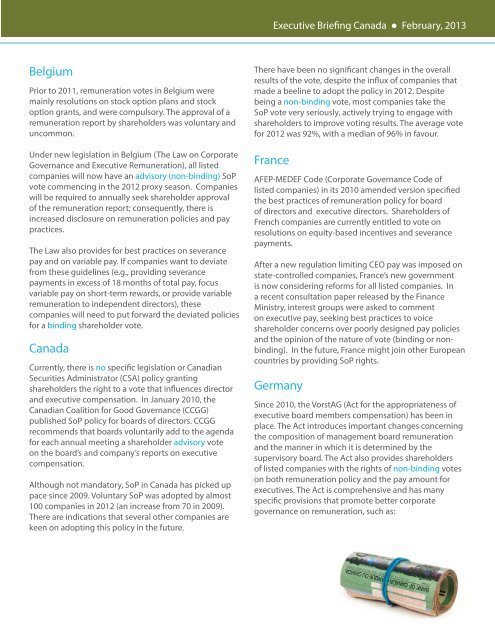Executive Briefing Canada - Hay Group
Executive Briefing Canada - Hay Group
Executive Briefing Canada - Hay Group
Create successful ePaper yourself
Turn your PDF publications into a flip-book with our unique Google optimized e-Paper software.
<strong>Executive</strong> <strong>Briefing</strong> <strong>Canada</strong> ● February, 2013<br />
Belgium<br />
Prior to 2011, remuneration votes in Belgium were<br />
mainly resolutions on stock option plans and stock<br />
option grants, and were compulsory. The approval of a<br />
remuneration report by shareholders was voluntary and<br />
uncommon.<br />
Under new legislation in Belgium (The Law on Corporate<br />
Governance and <strong>Executive</strong> Remuneration), all listed<br />
companies will now have an advisory (non-binding) SoP<br />
vote commencing in the 2012 proxy season. Companies<br />
will be required to annually seek shareholder approval<br />
of the remuneration report; consequently, there is<br />
increased disclosure on remuneration policies and pay<br />
practices.<br />
The Law also provides for best practices on severance<br />
pay and on variable pay. If companies want to deviate<br />
from these guidelines (e.g., providing severance<br />
payments in excess of 18 months of total pay, focus<br />
variable pay on short-term rewards, or provide variable<br />
remuneration to independent directors), these<br />
companies will need to put forward the deviated policies<br />
for a binding shareholder vote.<br />
<strong>Canada</strong><br />
Currently, there is no specific legislation or Canadian<br />
Securities Administrator (CSA) policy granting<br />
shareholders the right to a vote that influences director<br />
and executive compensation. In January 2010, the<br />
Canadian Coalition for Good Governance (CCGG)<br />
published SoP policy for boards of directors. CCGG<br />
recommends that boards voluntarily add to the agenda<br />
for each annual meeting a shareholder advisory vote<br />
on the board’s and company’s reports on executive<br />
compensation.<br />
Although not mandatory, SoP in <strong>Canada</strong> has picked up<br />
pace since 2009. Voluntary SoP was adopted by almost<br />
100 companies in 2012 (an increase from 70 in 2009).<br />
There are indications that several other companies are<br />
keen on adopting this policy in the future.<br />
There have been no significant changes in the overall<br />
results of the vote, despite the influx of companies that<br />
made a beeline to adopt the policy in 2012. Despite<br />
being a non-binding vote, most companies take the<br />
SoP vote very seriously, actively trying to engage with<br />
shareholders to improve voting results. The average vote<br />
for 2012 was 92%, with a median of 96% in favour.<br />
France<br />
AFEP-MEDEF Code (Corporate Governance Code of<br />
listed companies) in its 2010 amended version specified<br />
the best practices of remuneration policy for board<br />
of directors and executive directors. Shareholders of<br />
French companies are currently entitled to vote on<br />
resolutions on equity-based incentives and severance<br />
payments.<br />
After a new regulation limiting CEO pay was imposed on<br />
state-controlled companies, France’s new government<br />
is now considering reforms for all listed companies. In<br />
a recent consultation paper released by the Finance<br />
Ministry, interest groups were asked to comment<br />
on executive pay, seeking best practices to voice<br />
shareholder concerns over poorly designed pay policies<br />
and the opinion of the nature of vote (binding or nonbinding).<br />
In the future, France might join other European<br />
countries by providing SoP rights.<br />
Germany<br />
Since 2010, the VorstAG (Act for the appropriateness of<br />
executive board members compensation) has been in<br />
place. The Act introduces important changes concerning<br />
the composition of management board remuneration<br />
and the manner in which it is determined by the<br />
supervisory board. The Act also provides shareholders<br />
of listed companies with the rights of non-binding votes<br />
on both remuneration policy and the pay amount for<br />
executives. The Act is comprehensive and has many<br />
specific provisions that promote better corporate<br />
governance on remuneration, such as:
















